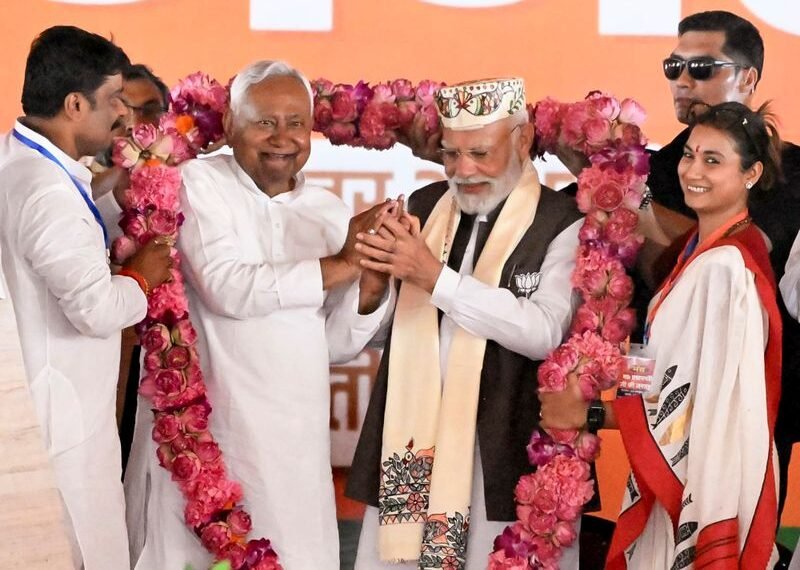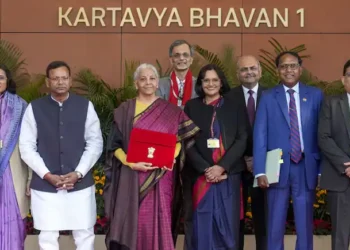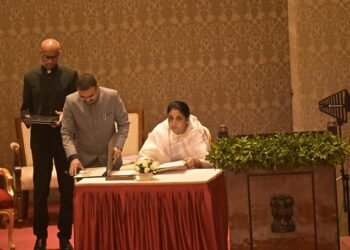The Prime Minister attacked the RJD and Congress, alleging they were misleading voters with false promises while enabling corruption and mafia control.
BY PC Bureau
New Delhi: Accusing the Mahagathbandhan of deep-rooted corruption and deceit, Prime Minister Narendra Modi on Thursday launched one of his sharpest attacks yet on the opposition alliance in Bihar. Speaking at a campaign rally in Chhapra, Modi claimed that the Rashtriya Janata Dal (RJD) and the Congress had not released a manifesto but a “rate list” — a coded document of “loot, ransom, and extortion.”
The remark came as Bihar enters the decisive stretch of campaigning ahead of its two-phase Assembly elections on November 6 and 11. The results will be declared on November 14, setting the stage for a high-stakes contest between the ruling National Democratic Alliance (NDA) and the opposition Mahagathbandhan, which has sought to frame the election as a referendum on unemployment, agrarian distress, and governance.
“The leaders of Jungle Raj are constantly misleading and luring you,” Modi said, invoking a term the BJP often uses to describe the RJD’s tenure in the 1990s and early 2000s, marked by alleged lawlessness and caste-based violence. “RJD’s declaration, Congress’s manifesto — they are not manifestos, they are rate lists. Every line in them hides an opportunity for extortion, ransom, and corruption.”
The crowd, largely drawn from Saran and neighbouring districts, responded with chants of “Modi-Modi,” underscoring the BJP’s strategy of turning the election into a personal referendum on the Prime Minister’s leadership and credibility.
“RJD और कांग्रेस कभी भी बिहार को विकसित नहीं बना सकतें. इन पार्टियों ने बरसों तक बिहार पर एकछत्र राज किया, पर आपके साथ विश्वासघात किया है!”
प्रधानमंत्री मोदी से सुनिए, वो पांच शब्द, जो RJD और कांग्रेस के कारनामों को बयां करते हैं…
पूरा वीडियो देखें : https://t.co/vd9tKJmInV pic.twitter.com/R1fnh08snT
— BJP (@BJP4India) October 30, 2025
Reviving the “Jungle Raj” Narrative
Modi’s speech signalled a clear attempt to revive memories of the RJD’s earlier rule, a period his party associates with criminality, poor governance, and social breakdown. He made particular reference to the 1998 Champa Biswas case, where the wife of a Dalit IAS officer had written to the Governor alleging repeated sexual assault by local criminals linked to political leaders.
“During the RJD government, even the Chief Minister’s office had turned into an office for mafias,” Modi said, suggesting that the return of the RJD-Congress alliance would undo years of development and stability under the NDA’s governance model.
The mention of the case appeared to be a strategic reminder to older voters while alerting the younger generation — many of whom did not witness the 1990s — about the perils of what Modi calls the “Jungle Raj” era.
READ: Imphal Valley Terror Groups Linked to China, Pakistan?
Targeting Congress on ‘Bhaiya’ Remark
PM Modi also sharpened his attack on the Congress, accusing it of disrespecting the dignity and contribution of Bihar’s people. He referred to a 2022 remark by former Punjab Chief Minister Charanjit Singh Channi, who had told voters not to allow “bhaiyas” from Uttar Pradesh and Bihar to enter Punjab — a comment made in the presence of Congress leader Priyanka Gandhi Vadra.
“Those with the lantern, the hand, and their INDIA alliance partners — all of them have insulted Bihar,” Modi said. “When people from Bihar go to work in other states, they do so with dignity and hard work. These parties mock them but come here to beg for their votes.”
The BJP has sought to frame such incidents as examples of the Congress’s “elitist contempt” for migrants and working-class communities, a theme that resonates strongly in Bihar, where millions work outside the state as labourers, drivers, and service staff.
Election Math and Party Line-Ups
As the campaign enters its final stretch, the BJP-led NDA—comprising the JD(U), LJP (Ram Vilas), Hindustani Awam Morcha (Secular), and Rashtriya Lok Morcha—is projecting itself as a coalition of stability and development. Chief Minister Nitish Kumar, who switched back to the NDA earlier this year, has been highlighting the alliance’s record on infrastructure, education, and law and order.
The Mahagathbandhan, led by the RJD, includes Congress, CPI-ML, CPI, CPM, and Mukesh Sahani’s Vikassheel Insaan Party (VIP). Tejashwi Yadav, RJD leader and former Deputy CM, has countered the BJP’s “Jungle Raj” rhetoric by accusing the NDA of weaponizing fear and failing to create jobs. He has promised one million government jobs if elected, a pledge aimed at Bihar’s restless youth demographic.
Corruption, Governance, and the Battle of Narratives
Modi’s “rate list” barb is the latest in a series of rhetorical jabs designed to portray the opposition as corrupt and self-serving. The phrase has already trended widely on social media, amplified by BJP leaders and influencers. Party strategists say the metaphor effectively links the opposition’s manifesto to a “menu of scams,” framing the NDA as the only force capable of ensuring accountability and order.
Meanwhile, Mahagathbandhan leaders have hit back, calling Modi’s speech a “desperate attempt” to deflect attention from rising unemployment and inflation. Congress spokesperson Jairam Ramesh posted on X (formerly Twitter), “The PM should stop reading from old scripts. People want answers about price rise and joblessness, not fairy tales from 1998.”
Political analysts note that while Modi’s rhetoric energizes the BJP’s base, it also risks overreliance on nostalgia for the “Jungle Raj” narrative at a time when many younger voters are more concerned with economic opportunity than with the past.
With just days to go before voting, the Bihar election remains too close to call. Surveys suggest a tight race, with the NDA banking on Modi’s popularity and Nitish Kumar’s experience, while the Mahagathbandhan leans on anti-incumbency and Tejashwi Yadav’s youth appeal.
In Chhapra, as the Prime Minister wrapped up his speech, he reiterated his call for a “corruption-free Bihar.” “This election is not just about forming a government — it is about protecting Bihar’s future from those who once sold its dignity,” Modi declared, drawing loud applause from the crowd.
As both sides double down on their core narratives, Bihar’s 2025 Assembly election is shaping up to be a referendum not just on governance but on memory — whether voters will choose to look back, or forward.













